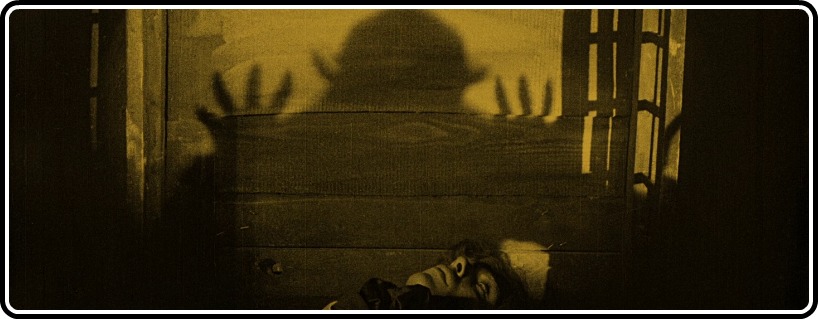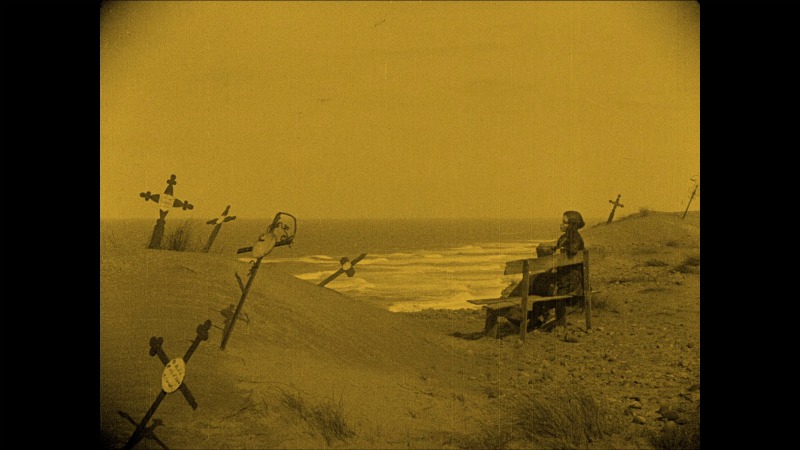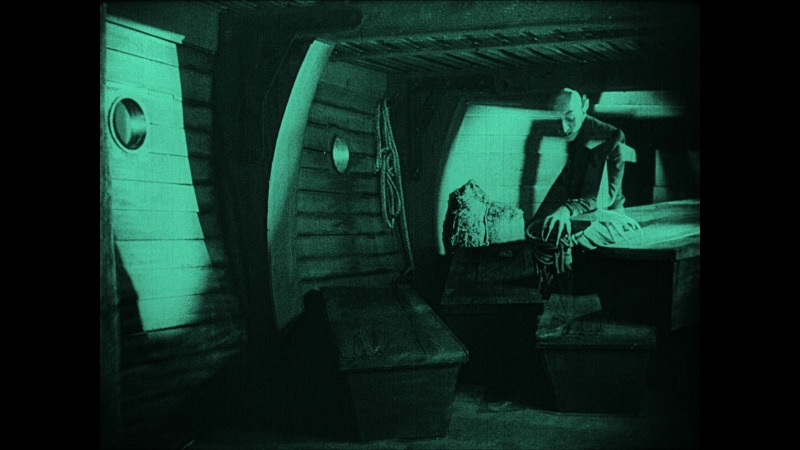
For a story I find as totally uninteresting as Bram Stoker’s Dracula, it sure has made for some very good films. Perhaps none better is the first of F.W. Murnau’s major lasting works, also one of the first films to adapt the 1897 novel. Famously abandoning not only the title of the work, but the character names as well, the film is as much a celebration of its own form as it is a narrative unto itself, utilizing all the power of silent cinema to churn a tepid study of not-even-archetypically-bland characters into a storm of tension, lust, and terror, not only of the monster at its center but of the spread of disease it is capable of unleashing.
The story’s inherent sexuality is twisted and contorted, still very present but refreshingly made nightmarish by giving us a Dracula of sorts (here called Count Orlok, played by Max Schrek) who is not at all an appealing presence. Where future adaptations and variations would seek to make the vampire more and more desirable, Nosferatu revels in his repulsiveness, instead communicating the desire he instills in Ellen, his chief prey, as an unconscious, unwilling, uncontrollable, and totally inexplicable ache for the touch she knows to be deadly. After all, just look at the guy. Whatever he’s got is probably carrying. Schrek, a suave enough looking dude who probably could have pulled off the lothario look in a more traditional adaptation (were there such a thing as “traditional Dracula adaptations” in 1922), never really had another role in lasting film, but in Nosferatu, he displays a rare abandonment of ego – he plays, more or less, the title character (“nosferatu” is a synonym for “vampire”), but is more a felt presence than an actual one, and when he is there, he’s unrecognizable under pounds of make-up. Yet in his few times onscreen, he crafts a creature that is entirely…”human” would be the wrong word, but certainly imbued with human-ity, without abandoning at all the otherworldly spell he’s meant to cast.

The film’s real protagonist, Thomas Hutter (Gustav von Wangerheim), sets the template for those to come – vastly less compelling than either his titular nemesis or that monster’s target, the protagonist’s wife. Greta Schröder, as Ellen, really taps into the potential for unleashed sexuality. Schröder might not have the inherent sex appeal of a Hollywood starlet, and plays the necessary frigidness early on in the film very naturally (the character is said to mirror Stoker’s own wife, with whom he was quite famously not intimate), but seems to become a whole different person once the vampire is in her mind, writhing and lunging and twisting and moaning (or so we infer, this being a silent film and all) as soon as the shadows settle in the night. She nicely echoes the angular horror that Schrek establishes, without the make-up he has at his aid. Using only her body, we believe that something unholy has her, or that she has become something unholy.
On the commentary track accompanying this release, David Kalat goes through great pains to point out just how collaborative a film this was, and he makes a very fine case for it that I am hard-pressed to dispute, let alone dismiss. Nevertheless, there is a reason F.W. Murnau’s career really started to take off after this. Call it a case of the director getting all the credit if you want, but the fact that he so wildly, thoroughly, and greatly lived up to the expectations a film such as this creates is evidence that he was hardly a mere manager on set, and the way he keeps the picture hurdling ever forward, reflecting the relentless, oncoming, unstoppable evil is as much a testament to his abilities just as a flat-out storyteller as the long shadows, canted angles, and myriad special effects sequences are to his considerable talents as an artist. Murnau directed ten films before this, only three of which survive (none of which, I’m sad to say, I have seen); by this point, he understood his medium inside and out, and it’s little wonder the picture continues to work as perfectly as it does.

Masters of Cinema brings that perfection to an absolutely gorgeous (Region-B locked) Blu-ray edition. Nosferatu had a fairly rough time of it in the early days, as Stoker’s widow sought continuously to have it destroyed (what with the whole business of it having been made illegally and all), but it survived basically because people liked it well enough to stash away prints here and there. As you can imagine, this has not left the film in the best of shape, and the print here is significantly damaged, though hardly unwatchable and still communicates the aesthetic significance of the film. Contrast, as we’ve come to expect from MoC, is very good, as is detail.
Only one score is provided, and it’s appropriate, as it was written upon the film’s release and recorded, for modern purposes, by the Radio Symphony Orchestra Saarbrücken, and is about as perfectly-suited to the film as one would imagine when faced with such credentials.
A few special features are present – an hour-long documentary on Murnau’s early years most notable among them, though the twenty-or-so-minute interview with Abel Ferrara, in which he dips in and out of the actual movie at hand and onto topics well beyond such a purview, is not without its pleasures – but the one that really counts is Kalat’s commentary. As is his style, he takes us through the film’s production and reception, making mention of some of the more outlandish myths surrounding it (most famous of all that Max Schrek was an actual vampire), but really just providing as fine a testament as you’ll ever find towards cementing Nosferatu‘s landmark status. It’s worth the price of the disc all on its own.


